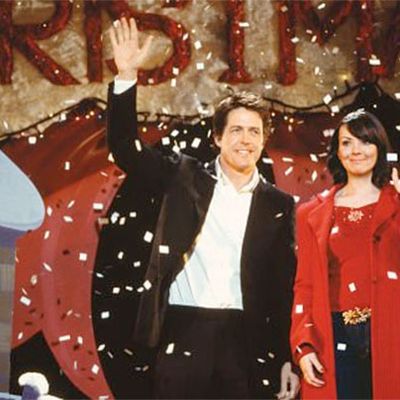
If all you wanted for Christmas this year was a bunch of people arguing about the film Love Actually, then you’re in luck. Partially owing to the fact that the holiday-themed rom-com had its ten-year anniversary this year, conversation about the film has kept at a steady hum because (a) it’s almost Christmas! and (b) none of us realized just how evenly (and passionately!) the line was drawn between Love Actually lovers and Love Actually haters. Vulture has to shoulder some of the blame, as this site did point out that when the now-beloved movie was released, a lot of critics hated it. Perhaps we didn’t realize how many people still agree with them, and how many people consider this ten-year-old blasphemy.
The Atlantic’s Christopher Orr, whose 2003 pan we featured in our roundup of original reviews wanted to let us know that, yes, he still hates it:
This is the point at which defenders of the film will reply, reasonably enough: So what? In movies beautiful people always fall in love with other beautiful people! What’s wrong with love at first sight, anyway? Which are both fair responses, as far as they go. But Love Actually is a considerable outlier among romantic comedies in its rigorous conviction not only that people fall in love without really knowing one another, but that they don’t even need to learn anything about each other to confirm their initial attraction.
So not only does Orr think Love Actually is not a good holiday film (“Insofar as Love Actually conveys the spirit of any holiday, that holiday is Valentine’s Day — and, indeed, the film served as a model for a few ensemble romantic comedies (He’s Just Not That Into You, Valentine’s Day) that have since been associated with that date”), it’s not a good rom-com either. And he’s not alone!
For all the hate that Orr has for Love Actually, those who love it, well, they really love it. Take Mother Jones’ Ben Dreyfuss, who writes:
Also, all of you, everybody, stop comparing Love Actually to most other romantic comedies. Love Actually is only a traditional romantic comedy insofar as it is a film about romance that has humor. It does not have the structure required of the genre. To be honest, if you’re going to compare it to any one film you should probably compare it to Crash, the working title of which I’d like to think was Racism, Actually. If the theme of Crash is “We’re all at least a little bit racist deep inside” the theme of Love Actually is “We’re all a little crazily romantic deep inside.”
If you’re comparing Love Actually to other rom-coms (whoops!), you’ve got it all wrong, he says, contending that Love Actually is about “thinking you’re in love”: “Almost all of the stories center around people who either early on, or before the film even begins, figure out they’re nuts about someone and then spend the five weeks before Christmas wondering, ‘What do I do now?’” Which makes sense if you’re thinking of it as a tragic story, like Think Progress’s Alyssa Rosenberg:
The point of Sarah’s story isn’t that having a mentally ill relative condemns a woman “to an early spinsterhood,” as Orr puts it. Rather, the problem is Sarah’s feeling of obligation to her brother (and the movie takes care to note how accommodating Harry, her boss, is of the calls), separate from her actual day-to-day responsibilities for his care. She’s displaced all of her emotional energy and ambitions for herself onto her brother. Sarah isn’t neglected or overlooked. She’s a tragic figure, and one of her own making.
Perhaps it doesn’t matter whether Love Actually is “good” or “bad,” just that it’s become part of a Christmastime ritual (whether you like it or not!). Anne Helen Petersen at the L.A. Book Review explains:
In order for a film to become ritualized, however, it must hew to the ideological formula. It can be a little postmodern splintered, like Love Actually, or be filtered through the lens of comedy, like National Lampoon’s Christmas Vacation, but it must also work to vivify the understanding of Christmas as about family and love, as opposed to its historic ideological engine (Christ) or its contemporary one (Capital)…To be clear, I like Christmas movies. Who doesn’t like ideological closure! It is preposterously reassuring! But “liking” something, and reveling in the comfort and joy that washes over me for 120 minutes before I return to the beloved catastrophe of my own family Christmases, is a very different thing than claiming a Christmas movie as “good.” I love the haze of just too much cheap champagne; that doesn’t mean I recognize it, or would tell anyone else, that it’s good.
Good, bad, happy, sad — whatever you think Love Actually is, let’s give it credit for being such a wonderful lightning rod this holiday season. Because if there’s one thing we could all use a little more of, it’s conversation around the Christmastime dinner table.

